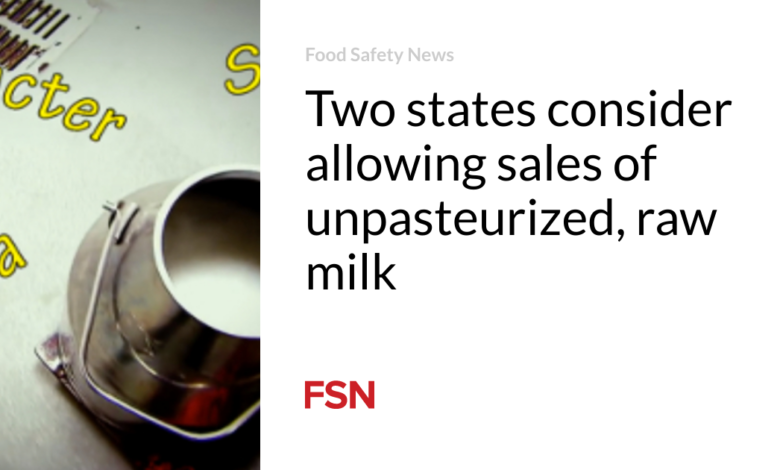Two states consider allowing sales of unpasteurized, raw milk

Two state legislatures have been handling bills for selling unpasteurized, raw milk. One in Michigan is stalled in committee, while the other in West Virginia has been approved without the governor’s signature.
It is against the law to sell raw milk across state lines, and many states have full or partial bans on its sale within their borders. Public health officers nationwide and in all states warn against consuming raw milk or products made from it because it has not been pasteurized to kill parasites, viruses, and germs such as E. coli, Salmonella, and Listeria. Public health warnings say it is hazardous for young children whose immune systems have not yet developed.
Michigan
The bill in Michigan, House Bill 5603, was introduced by Rep. Matt Maddock and read for the first time on the House floor on March 24. It was referred to the House Committee on Government Operations on the same day.
Under 5603, unpasteurized, raw milk could be sold to a final consumer or retail food establishment in Michigan if the raw milk and raw dairy products comply with specific rules.
One of those rules is a warning label that must be displayed in 12-point type or more significant. It must state: “WARNING: unpasteurized milk and dairy products may contain disease-causing microorganisms. Individuals at the highest risk of disease from these microorganisms include newborns and infants; the elderly; pregnant women; individuals taking corticosteroids, antibiotics, or antacids; and individuals with a chronic illness or another condition that weakens immunity.”
The Michigan bill also requires raw milk cooling and temperature holding and sets bacterial limits. It requires that milk-producing animals be tested once a year for brucellosis and tuberculosis but does not specify a testing regimen for other dangerous pathogens.
West Virginia
A bill regarding the sale of raw milk in West Virginia will become law in June even though Gov. Jim Justice has not signed it.
The bill’s lead sponsor, Del. Mike Hornby, R-Berkeley, called the legislation a “freedom bill” during an interview with From the States.
“If I want to purchase raw milk from my neighbor, I should be able to purchase and consume that milk,” Hornby told the House Health Committee. “Everybody who drinks raw milk knows it’s raw milk, and they choose to drink it.” Hornby did not address children whose parents give them raw milk.
Speaking against the bill, Del. Ric Griffith, D-Wayne, told West Virginia Watch that it is a bad idea. Griffith cited a list of possible contamination in raw milk, ranging from germs in feces, infected udders, and bovine tuberculosis to insects and rodents.
“I think Louis Pasteur was right,” Griffith said. “And I think we need to be very careful about the safety of our citizens by not allowing this.”
He added that he understands why supporters want to pass the bill so farms can make extra money.
West Virginia legislators relaxed controls on unpasteurized, raw milk in 2016 when they made so-called herd shares legal. Under herd-share laws, a person owns a portion of an animal or herd of animals and can then receive milk from the producing animal.
The bill requires a warning label on unpasteurized raw milk that states, “Consuming unpasteurized raw milk may increase your risk of foodborne illness, especially for children, elderly, immunocompromised individuals, and persons with certain medical conditions.” The label must also include the seller’s name and physical address and the date of production.
The West Virginia bill gives the state Departments of Agriculture and Health the right to impose additional regulations that do not conflict with the bill. The final version of the law does not include a contested provision that would have made sellers of raw milk immune to lawsuits and liability for claims related to personal injury for actual or alleged acts, errors, or omissions that occurred as long as the act was not intentional.
By not signing or vetoing the bill, the governor allowed it to become law 90 days after the legislature approved it on March 9.
(To sign up for a free subscription to Food Safety News,click here)



